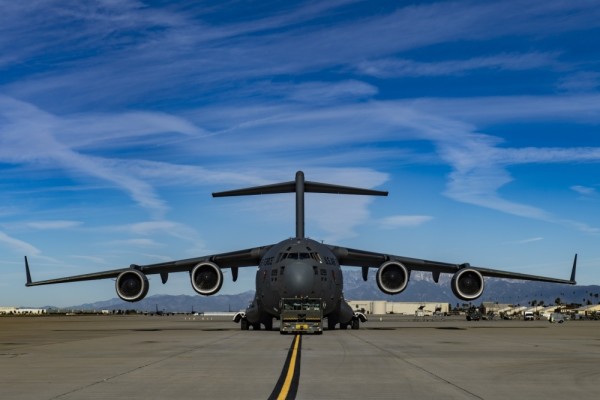

March Air Reserve Base in California will host nearly 200 U.S. citizens who were flown out of Wuhan, China due to the rapidly-spreading coronavirus, a Defense Department spokeswoman announced on Wednesday.
“March Air Reserve Base and the Department of Defense (DoD) stand ready to provide housing support to Health and Human Services (HHS) as they work to handle the arrival of nearly 200 people, including Department of State employees, dependents and U.S. citizens evacuated from Wuhan, China,” said Pentagon press secretary Alyssa Farah in a statement on Wednesday.
Wuhan is the epicenter of the coronavirus, which is a mild to severe respiratory illness that’s associated with symptoms of fever, cough and shortness of breath, according to the Centers for Disease Control and Prevention.
The virus has so far killed 132 people and infected nearly 6,000 others in China, according to news reports.
The Americans left China on Tuesday and touched down in Anchorage, Alaska late Tuesday night, according to CNN. The passengers are now en route to March ARB just over 60 miles outside Los Angeles, California.
Farah said HHS is in charge of caring for the evacuees and screening them for symptoms of the virus.
“DoD personnel will not be directly in contact with the evacuees and evacuees will not have access to any base location other than their assigned housing,” Farah said. “Should routine monitoring of the evacuees identify ill individuals, HHS has procedures in place to transport them to a local civilian hospital.”
Evacuation or no, coronavirus has already reached American shores. At least five cases of the illness have appeared in the United States, according to the Washington Post, and several dozen others have appeared on nearly every continent save South America.
Still, U.S. officials are urging calm in the face of the outbreak. Secretary of State Mike Pompeo told reporters on Wednesday morning that the U.S. does not want “to react in a way that actually has the potential to make things worse and not better.”
“[T]here are enormous efforts underway by the United States government to make sure that we do everything we can to protect the American people and to reduce the risk all around the globe,” he said.
Though investigations into the transmission of the virus are ongoing, CDC said it believes coronavirus is spread “via respiratory droplets produced when an infected person coughs or sneezes, similar to how influenza and other respiratory pathogens spread.”
Though there is no vaccine for coronavirus yet, the CDC says that the best way to prevent infection is to follow everyday preventive actions such as the following:
- Wash your hands often with soap and water for at least 20 seconds. If soap and water are not available, use an alcohol-based hand sanitizer.
- Avoid touching your eyes, nose, and mouth with unwashed hands.
- Avoid close contact with people who are sick.
- Stay home when you are sick.
- Cover your cough or sneeze with a tissue, then throw the tissue in the trash.
- Clean and disinfect frequently touched objects and surfaces.
If you were in China the last 14 days and feel sick with fever, cough or difficulty breathing, the CDC says you should do the following:
- Seek medical care right away. Before you go to a doctor’s office or emergency room, call ahead and tell them about your recent travel and your symptoms.
- Avoid contact with others.
- Not travel while sick.
- Cover your mouth and nose with a tissue or your sleeve (not your hands) when coughing or sneezing.
- Wash hands often with soap and water for at least 20 seconds to avoid spreading the virus to others. Use an alcohol-based hand sanitizer that contains at least 60% alcohol if soap and water are not available.
